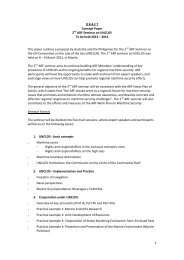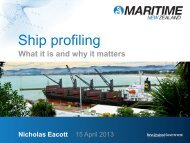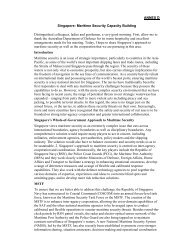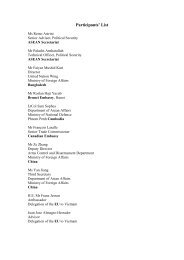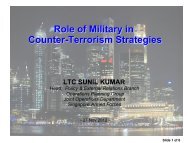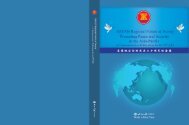Chairman Report 14th ARF HDUCIM.pdf - ASEAN Regional Forum
Chairman Report 14th ARF HDUCIM.pdf - ASEAN Regional Forum
Chairman Report 14th ARF HDUCIM.pdf - ASEAN Regional Forum
- No tags were found...
Create successful ePaper yourself
Turn your PDF publications into a flip-book with our unique Google optimized e-Paper software.
Final <strong>Report</strong> for the <strong>ASEAN</strong> <strong>Regional</strong> <strong>Forum</strong>Heads of Defense Universities/Colleges/Institutions Meeting6-10 November 2010Washington, District of Columbia1
7. Vice Admiral Ann E. Rondeau, USN, delivered welcoming and closing remarks. The key pointswere as follows:a. Asia holds the key to our future in many positive and critical ways. <strong>ASEAN</strong> is important forits member countries as well as for the United States’ relations with Asia. The UnitedStates recognizes the need to maintain and strengthen positive regional relationships inAsia and is willing to join existing regional networks and infrastructures.b. This group of Defense University leaders has a unique opportunity as educators andmilitary professionals to raise the level of professionalism of our nation’s militaryorganizations and influence enhanced regional relations.c. Effective military education programs must be based on history, as history provides thecontext for thinking about current situations and the future. While the conditions havechanged, there is nothing new in war. We must engage our students in transformationallearning so that they can take the information previously learned and apply that informationto understand current times. Professional military competency includes mastery of skillsand knowledge about how to act, requiring an education based on readings about warfightingexperiences and effective oral and written communication. Superlativeprofessional military education is comprised of four key elements: curriculum, faculty,student, and facilities. Of these elements, the first three are most important.d. The role of the military and its leaders is much different in the 21 st century. Although wewill fight if our leaders ask us to, our job today is to collaborate and make our nationsbetter. This requires us to learn how to lead together and teach tomorrow’s leaders how todo the same.e. During this conference, we discussed how we can exchange information using a webportal to which we can all have access. While information exchange is important, it is onlythe first step toward making us more interactive and collaborative. We want this new webportal to demonstrate that we as educators understand the power of using technology sothat each of us can benefit from what others are teaching. By leveraging the bestacademic practices and curricula, by sharing our lesson plans, and opening them up tointeractive feedback, we can move forward with providing the best training and educationfor our future leaders. Many of us have developed detailed courses and academic lessonplans that could provide benefit to others in our impressive group of nations. This will notbe an easy task to accomplish. All of us have our own language, culture, constraints,concerns and laws. Part of this collaboration includes understanding how to work in eachothers’ academic environment. With commitment, we can work within known parametersand toward opportunities to develop a robust system of curricula sharing.THEME OF THE MEETING8. The theme of this year’s Meeting, “The Role of Defense Universities, Colleges, and Institutes: Morethan Military Education”, was covered by the addresses and 15 papers. Presentations wereorganized around these four topics:3
accommodate this suggestion at this Meeting, it was suggested that this approach be usedin future Meetings when facilitated discussions are used.13. APAN Collaborative ToolConsistent with the <strong>ARF</strong> spirit of promoting dialogue and trust, and as agreed to at the 13thregional forum, an information exchange portal was activated and populated. The APAN (AllPartners Access Network) was selected as the portal site for its security and ease of use. APANhosts several organizations/communities related to <strong>ASEAN</strong> members. The <strong>ARF</strong> HDUCI portal onAPAN is designed to both support annual meetings via real-time blog posts, announcements,access to conference materials etc, and to sustain continued collaboration among the HDUCIbetween meetings via information sharing, discussions and collaboration space. NDU U.S. hasseeded the site with 2010 conference information, the institutional profiles of member countries,and some sample coursework. Users gain access by simply by registering for an APAN accountand requesting membership in the <strong>ARF</strong> HDUCI group. However, despite this open nature, securitymeasures restrict universal visibility of all features. The link to the main portal ishttps://community.apan.org/. It was agreed that oversight of the portal would pass between the<strong>Forum</strong> hosts 6 months prior to the meeting. Indonesia will assume responsibilities from the U.S. inmid-May 2011.14. 15 th Meeting HostIndonesia will host the 15 th annual <strong>ARF</strong> HDUCI meeting in 2011. MG Tippe announcedthe title for the 2011 <strong>ARF</strong> <strong>HDUCIM</strong> will be “Enriching and Transforming <strong>ARF</strong> DefenceEducation Establishment: Communication, Cooperation, Coordination.” His full remarksare at Appendix C. The three main themes will be as follows:1. Enhancing the ability of professional military educational institutions to develop,deliver and review educational “best practice” through inter-institutional andmultinational dialogue, support and cooperation.2. Integrating professional military educational institutions seamlessly into theoverall knowledge architecture of the region — in order to advance knowledgeacross all sectors of society — by working more closely and harmoniously withcivilian institutions in terms of research, development and publication.3. Positioning professional military educational institutions at the forefront of Asia-Pacific and <strong>ASEAN</strong> efforts to develop comprehensive strategies for addressingglobal, regional and local threats to security, stability and prosperity.6
TOUR/ACTIVITY15. Visits to the Smithsonian Air & Space Museum and Mount VernonOn 7 November, participants toured the Smithsonian Air & Space Museum and lunched atMount Vernon. The objective of these visits was to highlight landmarks that are importantto the history and culture of the United States.16. Presentation at the Marine Corps University and evening at the National Museum of the UnitedStates Marine CorpsDuring the presentation, delegates engaged Marine Corps University faculty in adiscussion of the system of USMC education. Before dinner on the evening of 8November, participants independently toured the National Museum of the Marine Corps.Presentations earlier that afternoon were given at the Marine Corps University at theMarine Corps Base Quantico. The presentations and museum showcased one example ofa United States professional military educational approach.17. Tour of the U.S. Capitol Visitors CenterOn the afternoon of 9 November, participants toured the U.S. Capitol Visitors Center andwere addressed by United States Senator James Webb who also took questions from thedelegates.ACKNOWLEDGEMENT18. The Meeting expressed its gratitude and appreciation to the United States for hosting.CONCLUSION19. Meeting concluded at 1700 HRS on 10 November 2010 and delegates adjourned to dinner.7


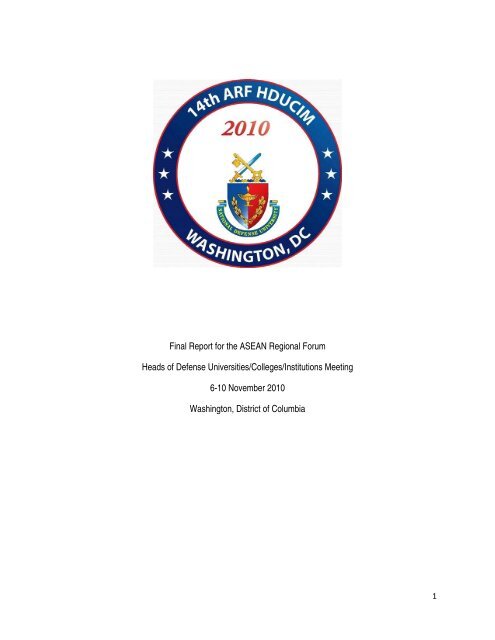
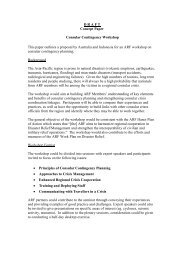
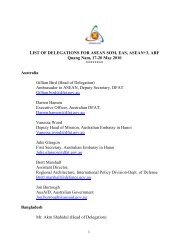
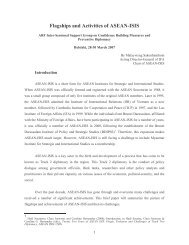
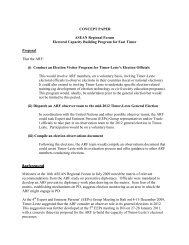
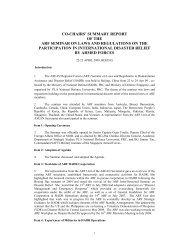
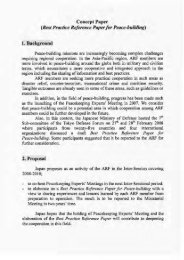
![10 ASAIN Presentation [Pakistan].pdf - ASEAN Regional Forum](https://img.yumpu.com/50649810/1/190x143/10-asain-presentation-pakistanpdf-asean-regional-forum.jpg?quality=85)
